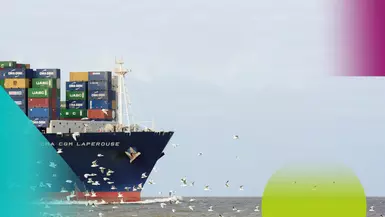
Waterways and Shipping Office (WSA)
Airlock now protecting maritime traffic
The figures are impressive – almost 95 percent of intercontinental trade is conducted via the oceans, with over 110,000 ship journeys made in Germany alone each year. Marine traffic is therefore an extremely important economic sector and one which is increasingly being digitalised, in part thanks to the German Federal Government’s Wasserstraßen- und Schifffahrtsverwaltung (Federal Waterways and Shipping Administration – WSV) – and thanks to Airlock.
Shipping and software have one thing in common – peace of mind has top priority, as no matter whether it is containers or data that are being transported, free movement has to be guaranteed, pirate/hacker attacks have to be averted and unauthorised entry into territories and environments has to be prevented. What’s interesting is that, as shipping becomes more digitalised, security requirements are increasing significantly – not just linearly, but exponentially.
We are increasingly relying on holistic solutions instead of singular applications.
Head of Application Security, Maritime Traffic Technology Department, Central Services Department, Security Zone, Wasserstraßen- und Schifffahrtsamt (Waterways and Shipping Office – WSA)
Wasserstraßen und Schifffahrtsämter (Waterways and Shipping Offices)
Wasserstraßen und Schifffahrtsämter (Waterways and Shipping Offices – WSÄ) are sub-agencies of the German Federal Government’s Wasserstraßen- und Schifffahrtsverwaltung (Federal Waterways and Shipping Administration – WSV) which has around 12,500 employees.
The WSÄ focus on traffic monitoring of the heavily frequented German coastal waters and busiest artificial waterway in the world, the Kiel Canal. A data network is operated across the entire coast for this purpose, which enables all traffic centres, pilot watch stations and lock control stations to be networked, and therefore ensures the safety and ease of shipping.
